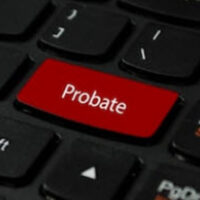Exempt Property In Florida Probate

Probate is when the court reviews the validity and authenticity of a Will. It is the administration of a decedent’s Will or the estate of a deceased person without a Will. If you recently lost a loved one, there are some important provisions under the Florida probate code you need to know about. For instance, you should know that the Florida probate code includes some safeguards to protect the decedent’s family, specifically the surviving spouse and children. One such protection is “exempt property.” Exempt property is not on the list of assets that must be probated. Exempt property passes directly to the surviving spouse and/or children and cannot be used to pay debts. Read on to learn more about exempt property in Florida probate.
Exempt Property
In the Florida probate context, all exempt property is free from all claims made against the decedent’s estate except perfected security interests thereon. Florida Statute 732.402 outlines the types of property that are considered “exempt property” in Florida probate. According to Florida Statute 732.402, exempt property in Florida probate consists of the following;
- Household furnishings and appliances in the decedent’s home up to a value of $20,000 as of the time of death.
- Two motor vehicles used regularly by the deceased person or family members. However, motor vehicles that weigh more than 15,000 pounds are not covered here.
- Tuition programs are authorized by section 529 of the Internal Revenue Code.
- Some types of educator death benefits.
However, there are additional rules governing exempt property you need to know about. If a property is specifically devised in a Will to someone who would not be entitled to exempt property, that property is excluded from the exempt property category. For example, if a motor vehicle is bequeathed in a Will to someone who’s not the decedent’s spouse or child, then under the Florida probate code, that vehicle does not qualify as exempt property.
Claiming Exempt Property Under the Florida Probate Court
If a person is entitled to exempt property, they must petition the court to determine exempt property. Otherwise, the person’s rights to exempt property will be considered waived. Such a petition must be filed by the later of four months after when the Notice of Administration was served or forty days after the closure of any proceeding involving the admission to probate or authenticity of the Will.
Family Allowance
Another mechanism designed to protect the decedent’s family during probate is “family allowance.” This is money out of the decedent’s estate for the surviving spouse or the decedent’s lineal heirs who were receiving support from the decedent awarded in addition to exempt property and other protection offered by the Florida probate code.
According to Florida Statute 732.403, family allowance can be distributed in a lump sum or periodic installments. But, the allowance cannot exceed $18,000.
Contact a Fort Lauderdale Probate Attorney
If you recently lost a loved one in Florida and need the help of a qualified probate attorney, contact a Fort Lauderdale probate attorney at the Law Offices of Joyce A. Julian, P.A.





